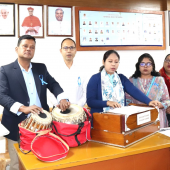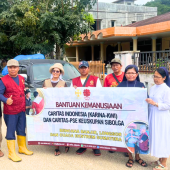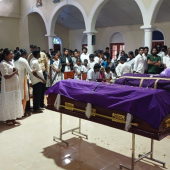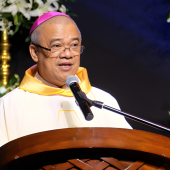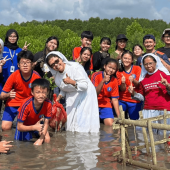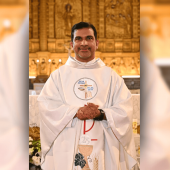Caritas Bangladesh promotes safe food production through organic farming

As the world observes World Food Day on October 16 under the theme “Hand in Hand for Better Foods and a Better Future”, Caritas Bangladesh is walking hand in hand with thousands of smallholder farmers to promote safe and sustainable food production through organic farming.
In the quiet village of Ahtibatta in Agailjhara upazila of Barisal, 60-year-old farmer Mohammad Solomon tends to his vegetable garden with care and devotion. A participant in the Doritry Project of Caritas Bangladesh, Solomon has embraced organic farming as a way to protect both human health and the environment.
“I am a small farmer,” Solomon told Radio Veritas Asia. “Before, we used chemical fertilizers and pesticides in our gardens. But after receiving training from Caritas, I learned how to produce vermicompost and use organic pesticides. Now, the vegetables grow well, and they are safe for our families and other consumers who buy it from us.”
Solomon, who also serves as the imam of Ahtibatta Mosque, shares his newfound knowledge with his community during Friday Jumma prayers. “I tell people that using organic fertilizers is not only good for our health but also saves money. Many in our village are now switching to organic methods because chemical fertilizers have become too expensive, and it is also a reason for human health hazards.”
Another farmer, Eti Pandey, 35, from the same village, echoed Solomon’s sentiments. “Caritas gave me 3,500 taka to start my vegetable garden,” she said. “I use vermicompost and organic pesticides. The cost is low, the yield is high, and the vegetables sell well in the market. I’ve even leased a pond and grown gourds, brinjals, and papayas on its banks. I’m earning more now and will continue using organic methods for a good life.”
Bangladesh’s agriculture sector is under pressure due to the rising cost and shortage of chemical fertilizers. With 80% of the country’s 6.8 million-ton annual fertilizer demand being imported, the government spent 7,717 crore taka in subsidies in the 2020–21 fiscal year. That figure has now surged to 25,000 crore taka, prompting the Agriculture Department to promote organic alternatives as a sustainable solution.
Officials emphasize that reducing dependence on chemical fertilizers is essential for building a resilient and environmentally friendly agricultural system. In this context, the work of Caritas Bangladesh is more relevant than ever.

Through its Doritry Project, supported by CAFOD, Caritas Bangladesh is empowering vulnerable communities by promoting eco-enterprise development and agro-ecological practices. The project not only trains farmers in organic farming techniques but also helps them market their produce and fertilizers, such as vermicompost, to generate income.
“The Doritry Project is not just about farming,” said a Caritas official. “It’s about protecting human health, preserving the environment, and ensuring long-term food security.”
According to the 2023–2024 Annual Report of Caritas Bangladesh, the organization’s Ecological Conservation and Food Security sector has made significant strides. A total of 8,207 farmers are now engaged in organic farming. They have produced over 1,000 tons of vermicompost, nearly 1,000 tons of pit compost, and are actively practicing agroecology.
These farmers have collectively produced over 2,000 tons of vegetables, 1,500 tons of cereal crops, 561 tons of pulses and oilseeds, 2,571 livestock, 20 tons of fish, 54,597 poultry, and 147,080 eggs. These products are used for family consumption, sale, and seed preservation, contributing to nutrition security, family income, and seed sovereignty.
Caritas Bangladesh’s approach aligns with Pope Francis’ call for integral ecology, where care for creation and care for the poor go hand in hand. By promoting organic farming, Caritas is not only helping farmers earn a better living but also ensuring that future generations inherit a healthier planet.
As the world reflects on the importance of sustainable food systems this World Food Day, the stories of farmers like Solomon and Eti remind us that real change begins at the grassroots, with hands in the soil, hearts in the community, and faith in a better future.
Radio Veritas Asia (RVA), a media platform of the Catholic Church, aims to share Christ. RVA started in 1969 as a continental Catholic radio station to serve Asian countries in their respective local language, thus earning the tag “the Voice of Asian Christianity.” Responding to the emerging context, RVA embraced media platforms to connect with the global Asian audience via its 21 language websites and various social media platforms.









